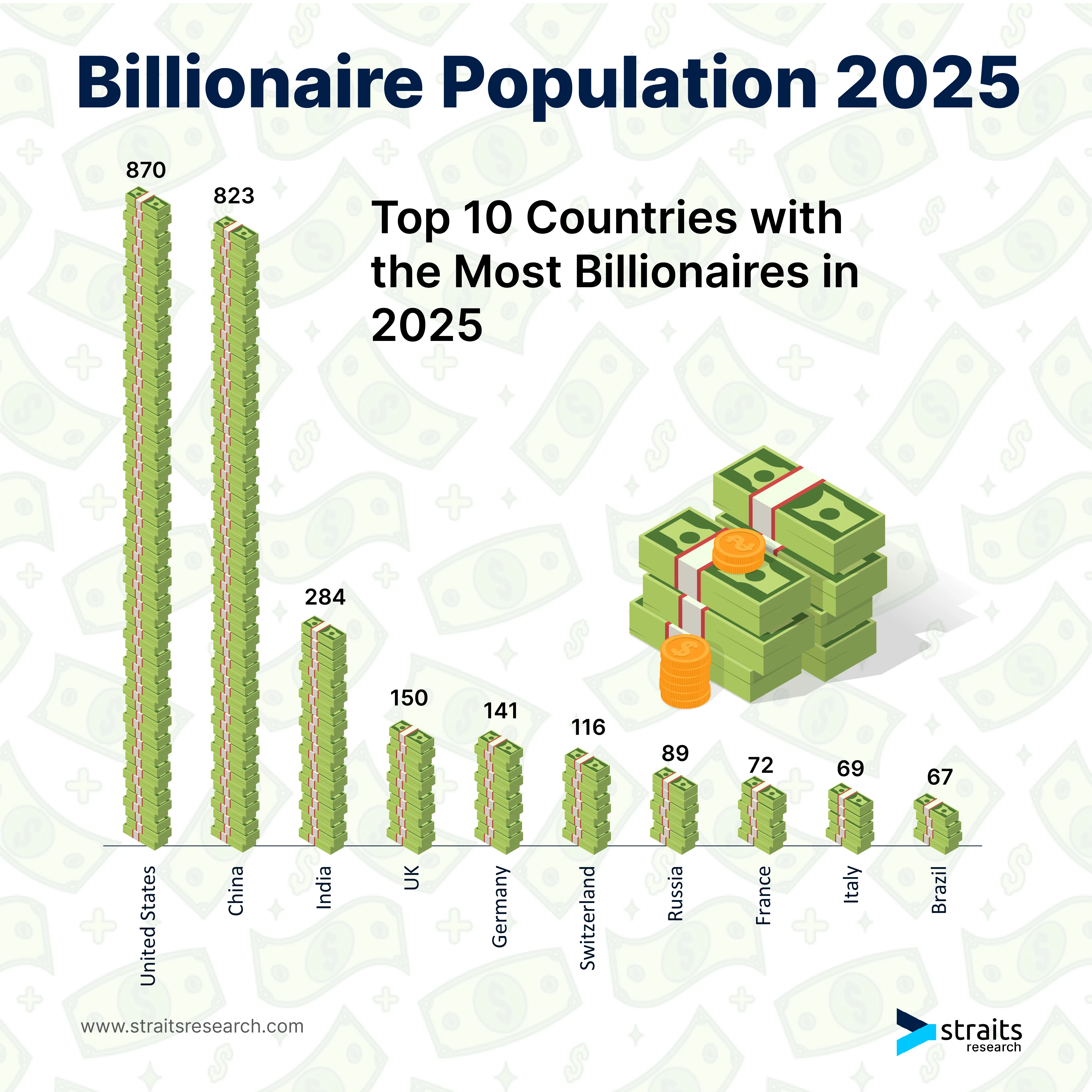Top Countries with the Highest Number of Billionaires in 2025

Billionaires significantly shape the economic landscape of their respective countries by promoting job creation, driving innovation, and contributing to national tax revenues. As successful entrepreneurs, they often establish businesses that employ thousands, produce essential goods and services, and benefit economic growth. Their charitable activities combat important social issues, and the reinvestment of their money promotes capital growth.
Countries With the Most Billionaires
With 870 billionaires, the US leads the world in the number of billionaires as of 2025. China comes in second with 823 billionaires, followed by India in third place with 284 billionaires, the United Kingdom in fourth place with 150 billionaires, and Germany in fifth with 141. Other notable countries include Switzerland (116), Russia (89), France (72), Italy (69), and Brazil (67).
The top 100 billionaires in the U.S. are estimated to have a combined net worth of more than $3 trillion in 2025. On the other hand, the combined net worth of China's 450 billionaires is $1.7 trillion. The majority of billionaires in the United States come from the financial and investment industry, which includes fintech, hedge funds, private equity, banking, and venture capital. This industry dominates with 464 billionaires, accounting for 15% of the list, and added approximately $400 billion in wealth over the past year alone.
The technology sector, specifically the TMT (Technology, Media, and Telecom) space, continues to produce the most number of billionaires in China. Manufacturing continues to be a powerful industry for wealth creation, but real estate and finance also make substantial contributions. In India, the industrial products sector leads in billionaire creation, followed by the pharmaceuticals industry. In the meantime, the UK's financial and investment sector continues to be a major contributor to billionaire wealth, a pattern that has persisted since 2014.
German billionaires usually make their fortunes in the manufacturing, retail, and grocery sectors. Software and pharmaceuticals are also quite important. Switzerland's financial sector dominates, though pharmaceuticals, chemicals, and food & beverage industries also contribute. The oil and gas industry is the main source of income for Russia's billionaire class, whereas the luxury goods sector in France, which includes fashion and cosmetics, is what drives wealth accumulation. Italy's food industry, especially confectionery, is the leading sector, whereas Brazil sees its billionaires rise from finance, beer, media, and construction industries.
Spending Patterns and Wealth Inequality
Elon Musk, representing the United States, will lead the global billionaire list in 2025 with a net worth of $420 billion due to Tesla's post-election stock surge and ventures in electric vehicles, space technology, and social media. Jeff Bezos follows with $266 billion, due to Amazon's success in e-commerce and cloud computing. Mark Zuckerberg holds third place with $242 billion, driven by Meta's AI and social media advancements. Mukesh Ambani, India's richest, ranks tenth globally with a net worth of $93.4 billion and has a strong foundation in retail, telecom, and energy.
Despite their small numbers, billionaires control a significant portion of their countries' wealth. In the U.S., billionaires comprise just 0.002% of the population, yet own more wealth than the bottom half of American households. In 2024, the top 1% in the U.S. held 30.8% of the nation's net worth. China's top 1% controlled about 32.3%, while India's top 1% held approximately 40%. Germany's wealthiest 1% owned 28.63% of the national wealth in 2021, a notable decline from nearly 50% in 1895. In contrast, the UK's top 1% held only about 10% of household wealth between 2020 and 2022.
Billionaire spending patterns reflect both indulgence and investment. Both fulfilment and investment are reflected in the spending habits of billionaires. Many billionaires in the United States spend up to $80 million a year on luxuries while simultaneously making significant charitable contributions. In China, annual luxury spending averages RMB 71,000, with preferences shifting to gold, art, jewellery, watches, and cultural experiences. In India, luxury goods account for 56% of billionaires' wealth, while experiences account for 44%. Younger Indian billionaires are known for extravagant expenditures like booking theatres or hosting celebrity events. In the UK, spending is concentrated on philanthropy, real estate, and luxury, whereas German billionaires tend to be more private and prioritise long-term investments.
In general, billionaires continue to be significant economic players who shape industries, national economies, and the distribution of wealth worldwide. They are praised and criticised alike.




